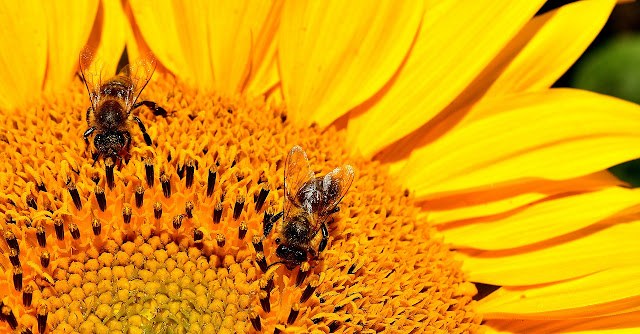We here at the DuPont Community Garden love us some bees! We know that a few of you out there might be allergic to their stings, but bees in the garden and agricultural fields are a good thing. In fact, they are critical in helping us to deliver a bountiful and varied harvest of fruits and vegetables.
Why?
Bees pollinate the vast majority of the world's fruits and non-grain vegetables They increase the yields of crops like coffee, tomatoes, eggplant, and peppers. And with the spread of Colony Collapse Disorder (CCD) and spraying for the Zika virus killing millions of bees annually, the world's food supply could very well be heavily affected by the continued loss of bees.
Yes, you read that correctly. Without bees, we wouldn't be eating most fruits, vegetables, and seeds such as almonds, apples, blueberries, strawberries, grapes, tomatoes, peppers, sunflowers, and much more.
What Bees Don't Pollinate
It's actually easier to show you what crops we would still be able to freely eat without bees around. While we might survive on this restricted diet (barely), we wouldn't have the variety of fruits and vegetables we have today. |
| Wheat, oats, barley, and rye (pollinated by the wind) |
 |
| Potatoes (grown from tubers; bees needed for creating hybrids) |
 |
| Corn (wind and hand-pollinated) |
 |
| Ginger (grown from tubers; bees required for seed production) |
 |
| Cactus (mostly moth, bat, and bird pollinated) |
 |
| Rice (wind-pollinated) |
Other foods not pollinated by bees:
- Sweet Potato and Yam
- Walnuts/Hickory nut/hazlenut/filbert
- Beets/Spinach/Chard
- Lettuces
- Banana (pollinated by birds and bats)
- Some peas and beans (although aided by bees)
Not much variety in that diet, eh? Let's take a look at what the introduction of bee-pollinated foods does to our diet.
What Bees Do Pollinate
Let's take a look at what the introduction of bee-pollinated foods does to our diet. Remember, without bees we wouldn't have these foods to eat: |
| Almonds |
 |
| Apples and pears |
 |
| Berries (strawberries, blueberries, raspberries, etc.) |
 |
| Citrus (Lemons, oranges, grapefruit, limes, etc.) |
 |
| Sunflower and Jerusalem Artichoke |
 |
| Stone fruit (cherries, peaches, plums, etc,; bee on cherry blossom) |
 |
| Coffee (mostly pollinated by bees) |
 |
| Melons and Squash (watermelon, cucumber, zucchini, acorn, etc.) |
 |
| Grapes (kiss your wine goodbye without bees!) |
 |
| Nightshades (tomatoes, peppers, etc.) |
 |
| Brassicas (cabbage, kale, broccoli, cauliflower; bees needed for seed production) |
 |
| Avocado and Asparagus |
 |
| Onion and shallots |
And a few more:
- Sugarcane
- Sesame
- Nutmeg
- Macademia nut
- Cranberry
- Kiwi fruit
- Coriander
- Anise
What do you think? I personally prefer the diet WITH bees as pollinators, thanks very much.
Next time we'll look at the problems bees and other pollinators face, and what we can do to help.
